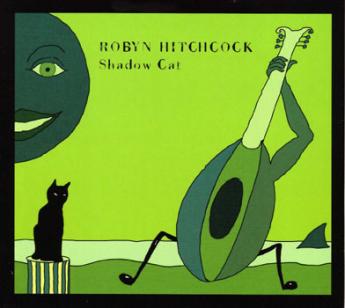Search
CD Review: Rychard Carrington reviews Shadow Cat - Robyn Hitchcock

Robyn Hitchcock has the kind of incessantly creative mind one associates with genius. As with Peter Cook, give him a subject and his mind will extemporise with exhilarating wit and imagination. If he hadn't made music he would probably have made his name as a writer, painter or cartoonist. It's a tribute to rock'n'roll -especially the late 60s psychedelic rock from which he has drawn much of his inspiration - that Hitchcock chooses it as his primary medium. But rock since those times has diversified to include within its aegis many diverse musical forms, not least the acoustic ballad, and it is not surprising that Hitchcock can periodically leave behind his rocking cohorts and be the solo singer-songwriter while retaining all his mastery. In fact I would argue that, alongside The Soft Boys' psychedelic classic Underwater Moonlight, his acoustic albums I Often Dream Of Trains (1984) and Eye (1990) are his finest. As so often with singer-songwriters, one feels more directly and intensely engaged with his inner world without other musicians and smooth production mediating. And a most engaging inner world it is too, in which the absurd, the sinister, the sublime and the defamiliarized mundane rub shoulders and party. It's nice to think that, as with another former resident, Syd Barrett, our city of Cambridge rather suited him.
It figures that Hitchcock is casually prolific; in fact one could be sure he would be constantly creative even if nothing he created was ever recorded. Hence he has written and recorded many numbers which weren't selected to be honed for his major releases. Some of these do get released in one form or another eventually, and quite often the songs are at least as good as on the major releases, while the sparser, freer arrangements often have as much appeal as do the more intricate productions. You & Oblivion, Hitchcock's solo assortment collection of 1980s material, is actually one of his greatest works. Shadow Cat, released by Terry Edwards' Sartorial Records, is effectively its successor, culled form the years 1993 to 1999.
And indeed it is good. The musical styles are ones with which devotees will be familiar - the laid-back, quietly perverse guitar ballad; the surreal majestic, autumnal piano ballad; the exhilarating guitar rush with defiantly perverse attitude; the mischievous a cappella ditty; the pleasing instrumental interlude; the haunting mouth harp reflection. And lyrics that, as always, slip through cracks in the pavement of reality:
Been up all night
Harnessing spears
Keeping the good ones
For Debbie Reynolds
Find me a shave
Shave me some hairs
Shared all the good ones
For Debbie Reynolds
Run me a bath
Right where the moose is
There's no excuses
For Debbie Reynolds
(For Debbie Reynolds)
Sometimes, yes, it is rather like Vic Reeves (and why not?). But the surrealism often conveys emotional truth poetically. In love, Robyn can be nasty, sexy and romantic:
I'll tow you out to the edge of the road
And I'll shake you once by the hand
Wait till a bus comes a-rumbling by
To scoop you up from off of my land
I'm not going to sneak away this time
I'll keep up a rocksteady gaze
Let my eyes be trained on yours
Till a bus disappears in a haze
(Never Have To See You Again)
I'm as lucky as the juice on your chin
I'm as hungry as a wolf round a bin
But I'll be always serenading you
Kissing you where you just don't expect, baby
- yeah!
(Real Dot)
How did I get here?
I was staring at your head
Next thing I recall
We were sharing the same bed
And the bathroom too
And the garden outside
Electricity was just lurking inside - it's true
What a beautiful shock every moment I've got I'm with you
By the look in your eyes I can see it surprises you too
(Beautiful Shock)
An interesting inclusion is Jimi Hendrix's The Wind Cries Mary, which performed in Hitchcock style sounds surprisingly like one of Hitchcock's own ballads (‘the traffic lights, they'll shine on blue tomorrow'). And, as usual, after a few listens one realises how catchy most of the tunes are. As you walk down the street, you find yourself singing lines like ‘lets go shopping on painkillers'.
Hitchcock's art, at once both charming and sinister, rekindles the potency of psychedelia, surrealism, Monty Python, Spike Milligan, Ivor Cutler, Edward Gorey, Mervyn Peake, Edward Lear, Edgar Allen Poe, Laurence Sterne, anyone who has found creative liberation in going sideways. It's ultimately very positive in its freely awry expansion; I once calculated that I've spent a grand total of six months of my life listening to Robyn Hitchcock's music, so I for one would be so much the poorer without it.
Cleethorpes.
Wryter: Rychard Carrington